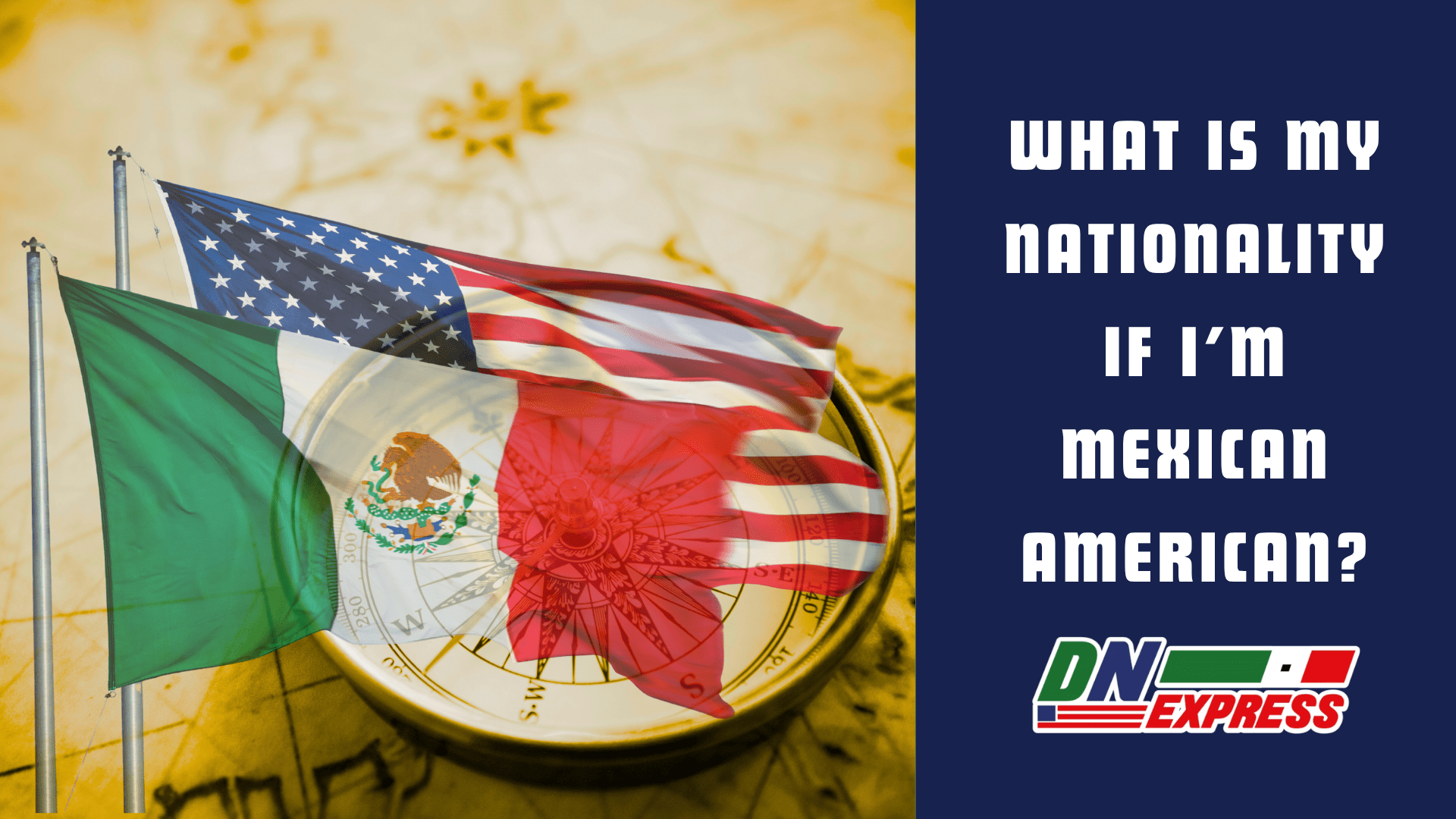
If you’re Mexican American, your nationality depends on legal status: U.S.-born with Mexican parents?
You’re likely entitled to Mexican citizenship too.
Dual nationality is legal in both countries, and reclaiming it can unlock property rights, passports, and more.
But the rules differ based on your situation:
- U.S.-born children of Mexican parents may qualify automatically.
- Adults recovering Mexican nationality aren’t “too old” to apply.
- Parents can register U.S.-born kids for Mexican citizenship.
- Spouses of Mexican citizens may apply after 2-5 years.
- Document errors? You can still qualify with corrections.
We help Mexican Americans secure their legal rights without consulate visits, handling even complex cases others avoid.
If you’re Mexican American, you may feel caught between two worlds, legally, culturally, emotionally. But what does nationality really mean for you?
Is it where you were born, the language you speak, or the bloodline your parents passed down?
This is a question thousands of Mexican Americans ask themselves every year. Many feel proud of their roots but unsure about their legal status.
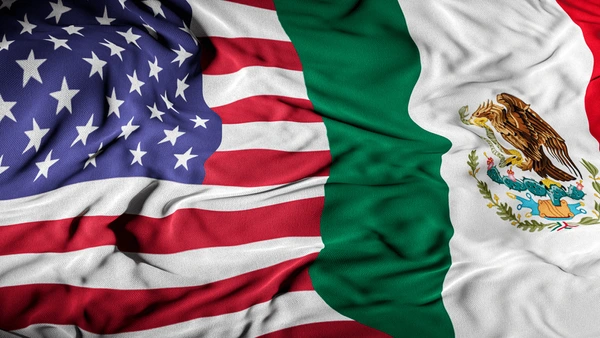
Does having Mexican parents automatically make you Mexican? Or are you “just” American in the eyes of the law?
The confusion grows when terms like ethnicity, nationality, and citizenship are used interchangeably.
Knowing the answer goes beyond identity, it’s about your rights.
Mexican nationality can give you access to a Mexican passport, property ownership in Mexico, voting rights, and even healthcare. It can also mean reclaiming a piece of your heritage that feels out of reach.
Want to understand exactly where you stand?
Keep reading, we’ll break it all down step by step.
Your Nationality as a Mexican American
If you’re Mexican American, your nationality depends on your legal status.
U.S.-born with at least one Mexican parent?
You likely qualify for Mexican citizenship, even if you’ve lived your whole life in the U.S. And the best part?
Both the U.S. and Mexico allow dual nationality, meaning you don’t have to give up one to claim the other.
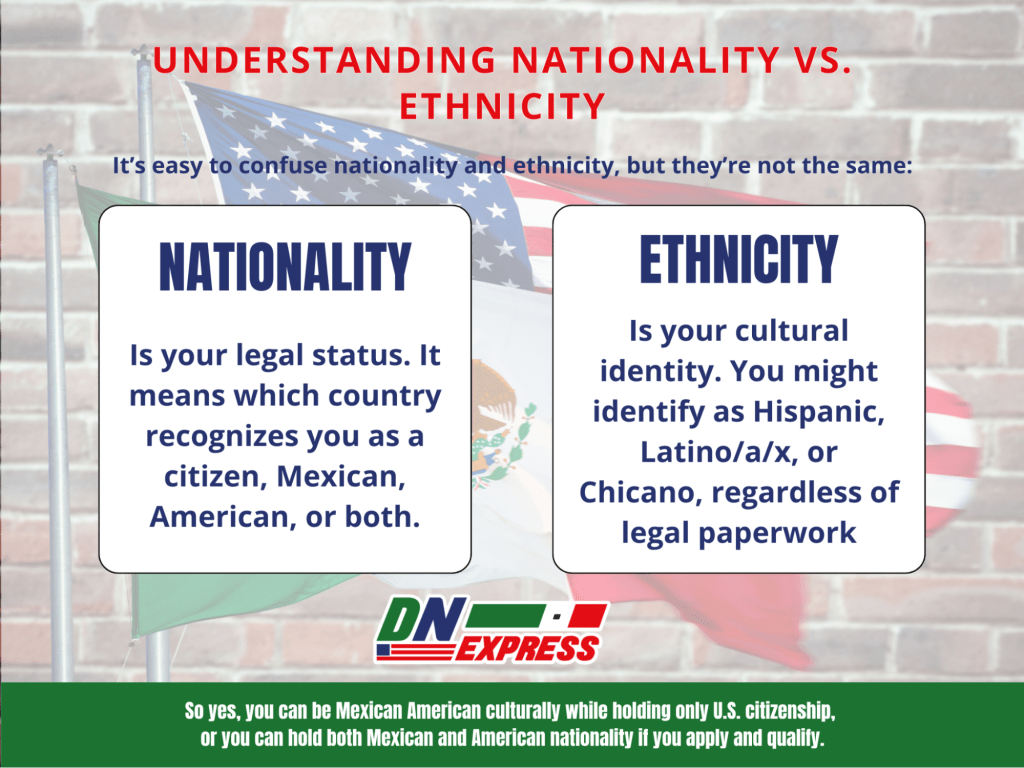
Understanding Nationality vs. Ethnicity
It’s easy to confuse nationality and ethnicity, but they’re not the same:
- Nationality is your legal status. It means which country recognizes you as a citizen, Mexican, American, or both.
- Ethnicity is your cultural identity. You might identify as Hispanic, Latino/a/x, or Chicano, regardless of legal paperwork.
So yes, you can be Mexican American culturally while holding only U.S. citizenship, or you can hold both Mexican and American nationality if you apply and qualify.
How Your Situation Affects Your Nationality
Your path to Mexican nationality depends on your unique situation. Whether you’re a U.S.-born child of Mexican parents, an adult recovering your rights, or someone fixing documentation, there’s a way forward.
Here’s how it breaks down:
-
U.S.-Born Children of Mexican Parents
If you were born in the U.S. to at least one Mexican-born parent, you’re automatically eligible for Mexican nationality under Article 30 of the Mexican Constitution.
Worry:
“My parents never registered me, am I too late?”
The good news: there’s no age limit to register. Even if decades have passed, we can recover missing parental documents and complete your registration without a consulate visit.
-
Adults Recovering Their Mexican Nationality
Many U.S.-born adults believe they’re “too old” or were told by a consulate they’re no longer eligible. This is a myth. Mexican law recognizes nationality by descent, regardless of age.
Question Answered:
“Can I apply if my Mexican parent is deceased?”
Yes.
We specialize in posthumous registrations, even if your parent never filed paperwork on your behalf.
-
Parents Applying for Their Children
Mexican parents can register their U.S.-born children for citizenship. For minors under 18, the process is straightforward. After 18, children apply as adults but retain the same rights.
Worry:
“Do I need both parents present?”
No.
We handle cases even when one parent is absent, unavailable, or no longer in contact.

-
Spouses of Mexican Citizens
Marriage doesn’t automatically grant Mexican nationality. Spouses may apply after 2 years of marriage living in Mexico or 5 years abroad.
Frequent Misunderstanding:
“I married a Mexican citizen, so I’m automatically Mexican.”
False.
You must go through a formal naturalization process. We guide spouses step by step to avoid delays and rejections.
-
People Correcting Documents for Eligibility
Many are denied because of small errors, misspelled names, wrong dates, or missing Mexican birth certificates. These issues can block your citizenship application.
Worry:
“The consulate rejected me because of a typo, can I ever apply again?”
Yes.
With proper corrections, We recover and amend records nationwide, even for difficult cases.
Why Work With Doble Nacionalidad Express?
Reclaiming your Mexican nationality isn’t always simple.
Between overwhelmed consulates, confusing paperwork, and legal roadblocks, many give up before they ever begin. That’s where we make the difference.
The DNExpress Advantage
We make dual citizenship possible, even for those told it couldn’t be done:
- Complete your dual citizenship remotely
No need for stressful consulate visits or months-long waitlists.
- Handled by licensed Mexican attorneys
Every case is reviewed and guided by legal professionals, not third-party processors.
- Transparent pricing with payment plans
We keep costs fair for working families and offer flexible payment options.
- Bilingual, full-service support
Our team answers calls, WhatsApp messages, and emails promptly, in English or Spanish.
- Specialists in denied or complex cases
From fixing rejected applications to recovering lost documents, we’ve seen (and solved) it all.
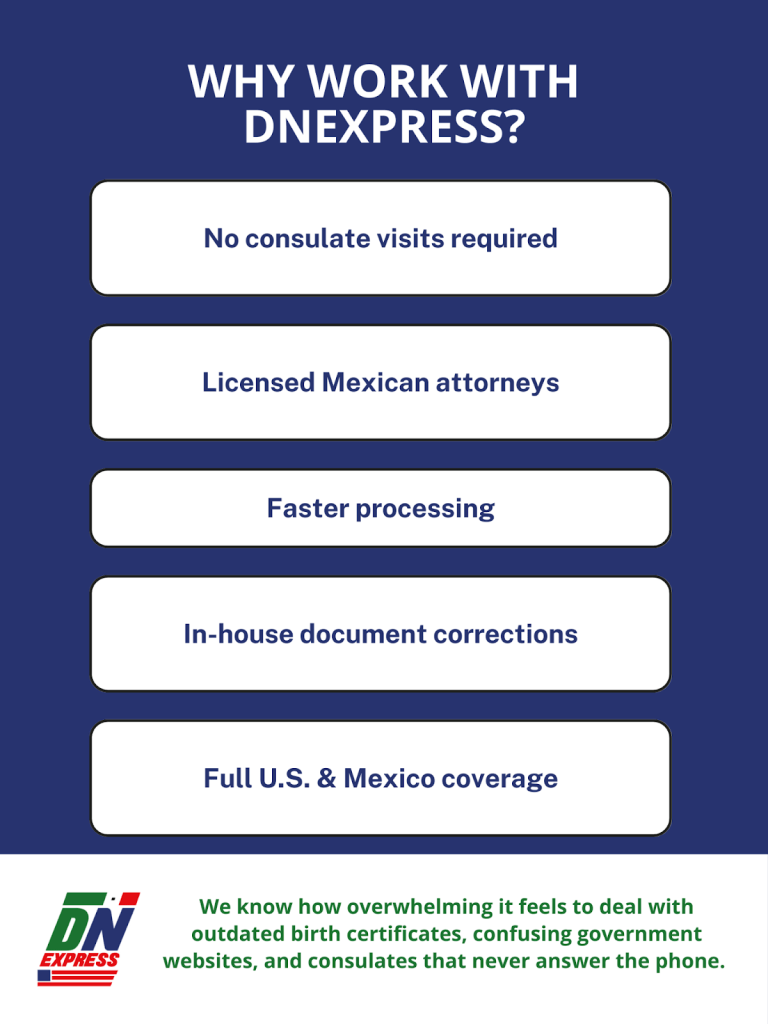
Downsides of Doing It Yourself
Trying to navigate this process alone comes with challenges:
- Long wait times at Mexican consulates
Appointments can take months or even years to secure.
- High rejection rates for minor errors
Even a small typo can lead to denial.
- Stressful legal systems in two countries
We know that navigating requirements in both Mexico and the U.S. proves overwhelming for most.
- No backup if things go wrong
Once denied, restarting the process is even harder without expert help.
Claim Your Mexican Nationality Today
Your heritage is more than a memory, it’s a right. We help Mexican Americans like you reclaim their nationality without the stress of consulate visits or endless paperwork.
From recovering lost documents to resolving complex cases, our team of licensed attorneys makes the process simple, secure, and successful.
Whether you’re doing this for yourself, your children, or to honor your parents’ legacy, we’re here to guide you every step of the way.
Schedule a Free Case Review today to see if you qualify.
Or Call or Message Us on WhatsApp, we’ll give you clear answers in minutes.
Your identity spans both sides of the border. Let’s make sure your paperwork does too.
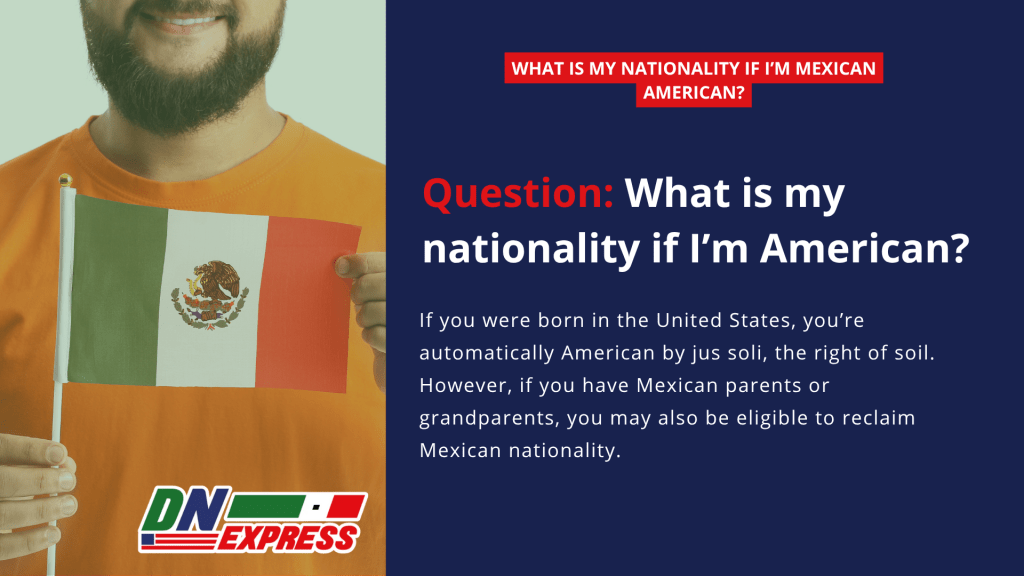
Key Questions Mexican Americans Ask About Their Identity
What is Mexican American nationality?
It depends. Legally, you may be only a U.S. citizen, only a Mexican citizen, or both if you pursue dual citizenship.
Being “Mexican American” often describes cultural identity, but it can also reflect your legal status if you hold both nationalities.
What is my nationality if I’m American?
If you were born in the United States, you’re automatically American by jus soli, the right of soil.
However, if you have Mexican parents or grandparents, you may also be eligible to reclaim Mexican nationality.
Am I Hispanic if I’m Mexican American?
Yes. “Hispanic” refers to ancestry tied to Spanish-speaking countries like Mexico.
It’s a cultural and linguistic label, not a nationality or race.
Are Mexican and Mexican American the same?
No. Mexican refers to legal nationality or someone born in Mexico.
Mexican American usually means a U.S.-born person of Mexican heritage, who may or may not hold Mexican citizenship.
Can you be both Mexican and American?
Yes.
Both the United States and Mexico recognize and allow dual nationality. You don’t have to renounce one to claim the other.
What do I put down for ethnicity?
On U.S. forms like the Census, Hispanic/Latino is considered an ethnicity, while race (White, Black, Asian, etc.) is a separate category.




